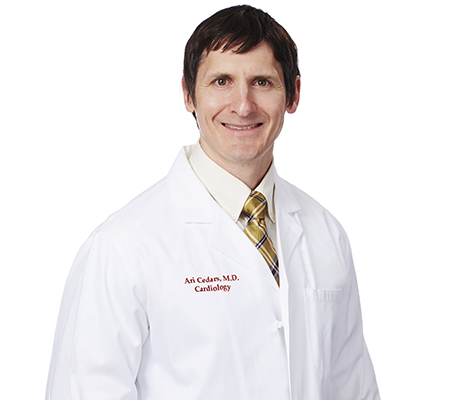
A new center at the Baylor Jack and Jane Hamilton Heart and Vascular Hospital† is focused on caring for the rising number of adults with health complications due to congenital heart disease.
Led by Medical Director Ari M. Cedars, M.D., who recently joined the medical staff at Baylor University Medical Center at Dallas, the new Center for Adult Congenital Heart Disease cares for patients born with a defect in one or more structures of the heart or blood vessels. These are the most common type of birth defects, affecting about 1 percent of all babies born each year. Thanks to rapidly advancing technology and new methods of treatment, these children can now live into adult hood. But while survival rates are rising, so is the incidence of complications in adults with the condition, even after repair in childhood.
"One of the problems physicians face in treating these conditions in adults is the misperception that corrective surgery in childhood permanently cures congenital heart defects," Dr. Cedars said. "Surgical technology and techniques were not nearly as refined in the 1950s and 1960s, when many of the procedures to treat pediatric heart problems were developed. And even under optimal conditions, patients born with abnormal cardiac anatomy are going to be subject to long-term consequences as result of their repair."
Not only do those operative repairs deteriorate over time, but another factor begins to have an effect in adult patients: the aging process. Adult congenital heart disease patients can face a triple threat: an abnormal heart structure, a deteriorating surgical repair and the acquired heart problems that many older people develop.
"There's nothing about being born with a heart defect that protects you from ultimately developing coronary heart disease, heart failure or abnormal heart rhythms," says Dr. Cedars. In 2011, adult congenital heart disease was recognized as a subspecialty within cardiology and the first board certification exam was offered in May 2015.
Prior to joining the medical staff at Baylor University Medical Center at Dallas, Dr. Cedars was an assistant professor of medicine in cardiology at Washington University School of Medicine where he was the recipient of the Craig Reiss Award for Excellence in Teaching and the Benico Barzilai Teaching Award. He is actively involved in clinical research and has published numerous related articles. Dr. Cedars graduated medical school from University of Texas Health Science Center, Houston, TX. He completed his internal medicine residency at University of Michigan Hospitals, Ann Arbor, MI and his cardiology fellowship at Washington University School of Medicine, St. Louis, MO.
# # #
Physicians provide clinical services as members of the medical staff at one of Baylor Scott & White Health's subsidiary, community or affiliated medical centers and do not provide clinical services as employees or agents of those medical centers, Baylor Health Care System, Scott & White Healthcare or Baylor Scott & White Health.
MEDIA CONTACT:
Susan Hall
Susan.Hall@BSWHealth.org
(214) 820-1817
About Baylor Scott & White Health
As the largest not-for-profit health system in the state of Texas, Baylor Scott & White promotes the health and well-being of every individual, family and community it serves. It is committed to making quality care more accessible, convenient and affordable through its integrated delivery network, which includes the Baylor Scott & White Health Plan, Baylor Scott & White Research Institute, the Baylor Scott & White Quality Alliance and its leading digital health platform – MyBSWHealth. Through 51 hospitals and more than 1,200 access points, including flagship academic medical centers in Dallas, Fort Worth and Temple, the system offers the full continuum of care, from primary to award-winning specialty care. Founded as a Christian ministry of healing more than a century ago, Baylor Scott & White today serves more than three million Texans. For more information, visit: BSWHealth.com
